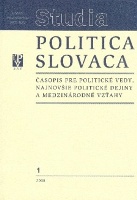Intelektuáli v slovenskej politike pred a po roku 1989
Intellectuals in Slovak politics before and after 1989
Author(s): Miroslav KusýSubject(s): Politics / Political Sciences
Published by: SAV - Slovenská akadémia vied - Ústav politických vied Slovenskej akadémie vied
Keywords: politics; democracy; Slovakia; intellectuals; dissent; Charta 77; intelligentsia; VPN; OF; Civic Forum; Public against Violence; Communism; HZDS; Movement for Democratic Slovakia
Summary/Abstract: Without intelligentsia, particularly without intellectuals, there would be neither Communist ideology, nor Communist movement. However, Marxist intellectuals of the communist regimes had been denied the freedom of intellectual movement, of critical invention. As a result, intellectual personalities (actors, writers, social scientists and also teachers) gradually, more or less conspicuously, left the Communist ranks. Their active participation grew into anti-Communist dissent. In Slovakia, this process was inconsistent and stopped somewhere halfway through as there was no compact or powerful intellectual dissent such as Charta 77 or the Polish KOR. When speaking about the Czechoslovak dissent launched by Charta 77, concentrated in the Chartist movement, which during the „Velvet Revolution of 1989” transformed itself into the „Civic Forum” (Občanské fórum), we mostly speak about the Prague events. Unlike their Czech partners, the Slovak intellectuals, who stood at the roots of the opposition movement „The Public against Violence (Verejnosť proti násiliu)”, were mostly members of the Communist establishment. The transformation process of the Czech Civic Forum and the Slovak Public against Violence produced new winners of the parliamentary elections of 1992, who were clearly and unambiguously separate both from the Czech intellectual dissent and from the Slovak intellectual elite and who divided Czechoslovakia into two independent states: the Czech Republic and the Slovak Republic. The new situation in the post-Communist Slovak Republic very strongly suggested certain analogies with the intellectual attitude to politics during the Communist era. The then victorious Movement for Democratic Slovakia (Hnutie za demokratické Slovensko) came into power, supported by part of the Slovak intellectual representation in a similar manner as did the Communist Party following the events of 1948. However, intellectuals gradually thinned the ranks of the Movement for Democratic Slovakia. As in the period when Communism went into decline in Czechoslovakia, so in this period, the only adherents who remained faithful to this „victorious movement” were party and state apparatchiks whose number, however, was not suffi cient for the effective control of its members and constituents. Vladimír Mečiar, President of the Movement for Democratic Slovakia, unwittingly managed to gather the Slovak intellectual elite under an umbrella of intellectual dissent. At that time, the main priority was getting rid of Mečiar and mečiarism, i.e., of his principle of one-leader management, which is inappropriate in the context of democracy and which is bred by pre-democratic and anti-democratic societies. The situation, by which the Slovak society became visible before the fall of mečiarism in 1997, could, from a certain perspective, be described as a crisis of political elite. This was a crisis of the Slovak political aggregate, which manifested itself in the behaviour of its actors.
Journal: Studia Politica Slovaca
- Issue Year: I/2008
- Issue No: 1
- Page Range: 54-73
- Page Count: 20
- Language: Slovak

